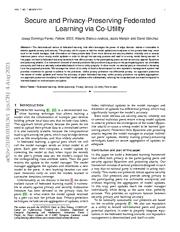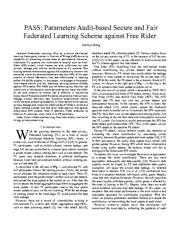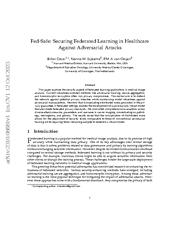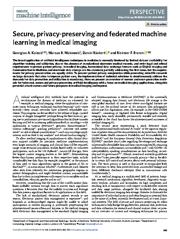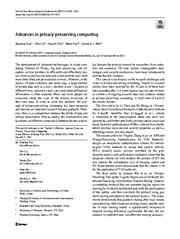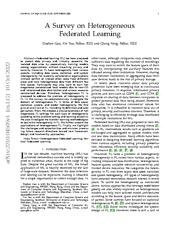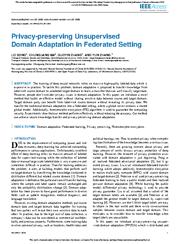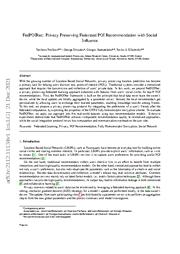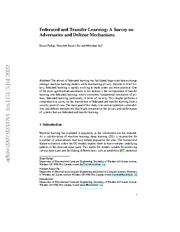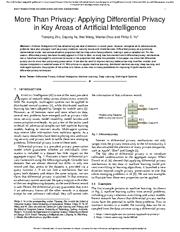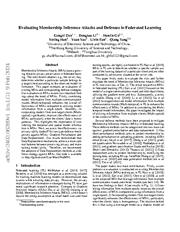A copy of this work was available on the public web and has been preserved in the Wayback Machine. The capture dates from 2021; you can also visit the original URL.
The file type is application/pdf.
Filters
Secure and Privacy-Preserving Federated Learning via Co-Utility
[article]
2021
arXiv
pre-print
Unlike privacy protection via differential privacy, our approach preserves the values of model updates and hence the accuracy of plain federated learning; unlike privacy protection via update aggregation ...
The decentralized nature of federated learning, that often leverages the power of edge devices, makes it vulnerable to attacks against privacy and security. ...
The authors are with the UNESCO Chair in Data Privacy, but the views in this paper are their own and are not necessarily shared by UNESCO. ...
arXiv:2108.01913v1
fatcat:w65l2vgh2jdfpdbsursc3zl3bm
Privacy-preserving Transfer Learning via Secure Maximum Mean Discrepancy
[article]
2020
arXiv
pre-print
As a result, both the source domain and target domain can fully utilize their data to build more scalable models. Experimental results demonstrate that our proposed SMMD is secure and effective. ...
compromising the data privacy. ...
Federated learning can be divided into two categories, i.e., horizontal federated learning and vertical federated learning. ...
arXiv:2009.11680v2
fatcat:xu3fudbzmzdhba25wczfzq7v6q
PASS: Parameters Audit-based Secure and Fair Federated Learning Scheme against Free Rider
[article]
2022
arXiv
pre-print
In this paper, we propose a Parameter Audit-based Secure and fair federated learning Scheme (PASS) against FR attacks. ...
Federated Learning (FL) as a secure distributed learning frame gains interest in Internet of Things (IoT) due to its capability of protecting private data of participants. ...
INTRODUCTION ith the growing attention to the data privacy, Federated Learning (FL), as a kind of secure distributed Machine Learning (ML) frame, is extensively used in Internet of Things (IoT) [1] - ...
arXiv:2207.07292v1
fatcat:k4m3uawjhfdvbk3vfkdq3f4z3q
Fed-Safe: Securing Federated Learning in Healthcare Against Adversarial Attacks
[article]
2023
arXiv
pre-print
This paper explores the security aspects of federated learning applications in medical image analysis. ...
Current robustness-oriented methods like adversarial training, secure aggregation, and homomorphic encryption often risk privacy compromises. ...
The collaboration project is co-funded by the PPP allowance made available by Health Holland, Top Sector Life Sciences & Health, to stimulate public-private partnerships. ...
arXiv:2310.08681v1
fatcat:pcmda55k75gndaz27csowlo74m
Secure, privacy-preserving and federated machine learning in medical imaging
2020
Nature Machine Intelligence
Passerat-Palmbach and the OpenMined project members for their support and critical appraisal, and B. Farkas for creating the article's illustration. ...
Here, we present an overview of current and emerging techniques for privacy Secure, privacy-preserving and federated machine learning in medical imaging Georgios A. Kaissis 1,2,3 , Marcus R. ...
Federated learning thus offers an infrastructural approach to privacy and security, but further measures, highlighted below, are required to expand its privacy-preserving scope. ...
doi:10.1038/s42256-020-0186-1
fatcat:qpuygpf6ojcrlpqg6a5hbsdfyq
Advances in privacy-preserving computing
2021
Peer-to-Peer Networking and Applications
The seventeenth article by Yuanming Zhang et al. on 'A Machine Learning Based Approach for User Privacy Preservation in Social Networks' develops a machine learning-based approach in online social networks ...
to privacy-preserving computing. ...
Wei focuses his research efforts on cloud and edge computing, IoT, 5G, big data, and machine learning. ...
doi:10.1007/s12083-021-01110-9
fatcat:o5vvf6ezcna2pc32g6oapioalu
A Survey on Heterogeneous Federated Learning
[article]
2022
arXiv
pre-print
Federated learning (FL) has been proposed to protect data privacy and virtually assemble the isolated data silos by cooperatively training models among organizations without breaching privacy and security ...
Then, We propose a precise taxonomy of heterogeneous FL settings for each type of heterogeneity according to the problem setting and learning objective. ...
Privacy Preservation Techniques There are four types of privacy preservation approaches widely used for privacy preserving machine learning, namely 1) secure multi-party computation (MPC), 2) homomorphic ...
arXiv:2210.04505v1
fatcat:yxzkgbknhje7tdfevjnalsvuiq
Grounding Foundation Models through Federated Transfer Learning: A General Framework
[article]
2024
arXiv
pre-print
In addition, we overview advanced efficiency-improving and privacy-preserving techniques because efficiency and privacy are critical concerns in FTL-FM. ...
Federated Transfer Learning (FTL), the combination of federated learning and transfer learning, provides promising solutions to address these challenges. ...
Therefore, developing secure federated learning protocols and cutting-edge protection techniques is vital for protecting data privacy and system security. (2) Operational efficiency: reducing the power ...
arXiv:2311.17431v11
fatcat:iq2klsnsurax7ngb7xlf2s2syy
Privacy-preserving Unsupervised Domain Adaptation in Federated Setting
2020
IEEE Access
Her main research interests include machine learning, the security and privacy of artificial intelligence, federated learning. ...
CONCLUSION We combine domain adaptation with federated learning which is a recent advance in privacy protection, and introduce privacy-preserving unsupervised domain adaptation which can provide secure ...
.: Preparation of Papers for IEEE TRANSACTIONS and JOURNALS to privacy preservation, it has good property of no loss in prediction accuracy. ...
doi:10.1109/access.2020.3014264
fatcat:4iqyiglslnfbzdwndvdji3spyi
Federated Learning for Internet of Things: Recent Advances, Taxonomy, and Open Challenges
[article]
2021
arXiv
pre-print
Although federated learning can offer better privacy preservation than centralized machine learning, it has still privacy concerns. ...
Third, we propose two IoT use cases of dispersed federated learning that can offer better privacy preservation than federated learning. ...
. • Security and privacy: Although federated learning was developed to preserve the users' privacy, it still faces privacy challenges. ...
arXiv:2009.13012v2
fatcat:4oqifqi5czfyxiqe7gjewmuzsq
More Than Privacy: Applying Differential Privacy in Key Areas of Artificial Intelligence
[article]
2020
arXiv
pre-print
It can also be used to improve security, stabilize learning, build fair models, and impose composition in selected areas of AI. ...
However, alongside all its advancements, problems have also emerged, such as privacy violations, security issues and model fairness. ...
However, if the differential privacy can contribute to stability, or security, the utility may increase, such as in federated learning or fairness. ...
arXiv:2008.01916v1
fatcat:ujmxv7eq6jcppndfu5shbzkdom
FedPOIRec: Privacy Preserving Federated POI Recommendation with Social Influence
[article]
2021
arXiv
pre-print
In this work, we present FedPOIRec, a privacy preserving federated learning approach enhanced with features from users' social circles for top-N POI recommendations. ...
To this end, we propose a privacy preserving protocol for integrating the preferences of a user's friends after the federated computation, by exploiting the properties of the CKKS fully homomorphic encryption ...
Xiao, Prefer: Point-of-interest recommendation with efficiency and privacy-preservation
via federated edge learning, Proc. ACM Interact. Mob. ...
arXiv:2112.11134v1
fatcat:5v4scfks6bawlknkfru4nuxlcu
Federated and Transfer Learning: A Survey on Adversaries and Defense Mechanisms
[article]
2022
arXiv
pre-print
This chapter performs a comprehensive survey on the intersection of federated and transfer learning from a security point of view. ...
The main goal of this study is to uncover potential vulnerabilities and defense mechanisms that might compromise the privacy and performance of systems that use federated and transfer learning. ...
Acknowledgements This work is supported by the Natural Sciences and Engineering Research Council of Canada (NSERC) under funding reference numbers CGSD3-569341-2022 and RGPIN-2021-02968. ...
arXiv:2207.02337v1
fatcat:rf4fdiunnnehjpvjhbmncrt3ka
More Than Privacy: Applying Differential Privacy in Key Areas of Artificial Intelligence
2020
IEEE Transactions on Knowledge and Data Engineering
It can also be used to improve security, stabilize learning, build fair models, and impose composition in selected areas of AI. ...
However, alongside all its advancements, problems have also emerged, such as privacy violations, security issues and model fairness. ...
However, if the differential privacy can contribute to stability, or security, the utility may increase, such as in federated learning or fairness. ...
doi:10.1109/tkde.2020.3014246
fatcat:33rl6jxy5rgexpnuel5rvlkg5a
Evaluating Membership Inference Attacks and Defenses in Federated Learning
[article]
2024
arXiv
pre-print
Membership Inference Attacks (MIAs) pose a growing threat to privacy preservation in federated learning. ...
Next, we assess the effectiveness via privacy-utility tradeoff for two type defense mechanisms against MIAs: Gradient Perturbation and Data Replacement. ...
This variant of federated learning places a heightened emphasis on the preservation of privacy throughout the federated learning process. ...
arXiv:2402.06289v1
fatcat:hnc5pnqyinfidhk6mefubgf5ve
« Previous
Showing results 1 — 15 out of 13,053 results

